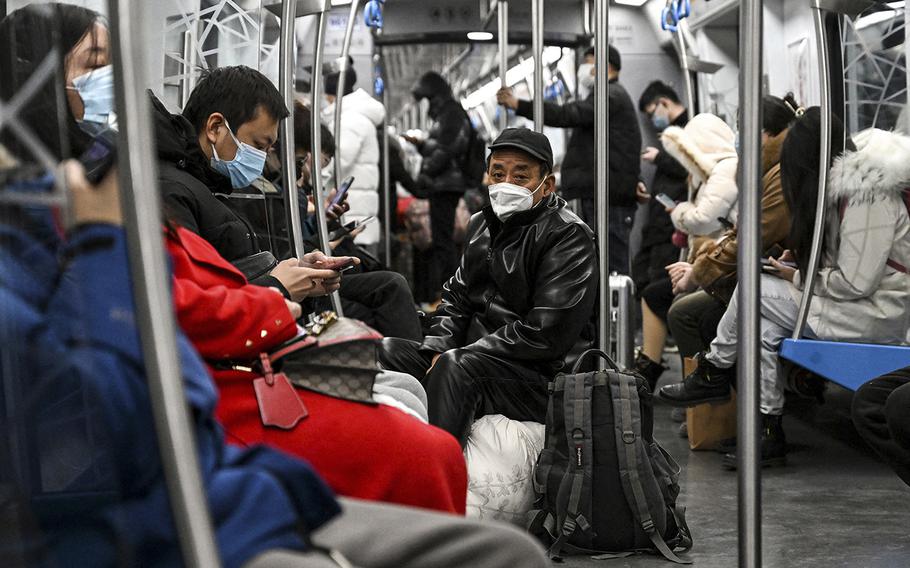
People wear face masks on a train amid the COVID-19 pandemic in Beijing on Dec. 19, 2022. (Noel Celis, AFP via Getty Images/TNS)
A federal judge in Missouri ruled Friday that China concealed knowledge of the emerging coronavirus in the pandemic’s crucial early days and used the extra time to stockpile protective equipment. The decision hands Missouri Attorney General Andrew Bailey (R) a high-profile legal victory without a clear path toward enforcement.
Missouri won the case in a default judgment of more than $24 billion after the Chinese agencies listed as defendants in the lawsuit — including the Communist Party of China and the city government in Wuhan, where many of the first human cases of COVID-19 were identified - “failed to appear or otherwise answer after being properly served,” according to the ruling from Judge Stephen Limbaugh Jr. of the Eastern District of Missouri.
Bailey’s predecessor, now-Sen. Eric Schmitt, R-Mo., first sued China in April 2020 over its “appalling campaign of deceit, concealment, misfeasance, and inaction” that he claimed had unleashed the virus.
Bailey, who shepherded the lawsuit after he took office in January 2023, said the state will collect “every penny” from the judgment by “seizing Chinese-owned assets, including Missouri farmland.” His office suggested it may work with the Trump administration to help identify and seize Chinese assets.
The Chinese Embassy did not immediately reply to a request for comment from The Washington Post on Saturday. In a statement to the New York Times, the embassy said it would not recognize the judgment and would “firmly take reciprocal countermeasures according to international law” if its interests are impacted.
The White House did not immediately respond to a request for comment Saturday.
The Missouri attorney general’s lawsuit did not claim any specific origin for the virus, which researchers have debated for years, with some arguing it started after a natural spillover from animals and others arguing it was caused by a laboratory leak. Instead, the lawsuit focused on the accusation that Chinese leaders knew of the existence and human-to-human transmission of the virus as early as September 2019. The World Health Organization did not know about it until December 2019.
Prosecutors submitted evidence that included a purported statement from a Chinese professor at Wuhan University who said he had knowledge of an individual with COVID-19 in September 2019 and reports from the U.S. State Department that it had “reason to believe” several researchers at the Wuhan Institute of Virology became sick with COVID-like symptoms in autumn 2019. Around this time, the lawsuit alleged, the Chinese province where Wuhan is located began purchasing more pathogen detection equipment, both in “total contract value and number of contracts.”
“According to frontline doctors, by November 2019 the rate of illness in Wuhan was so high that government officials were cancelling classes in some high schools,” Limbaugh wrote in his ruling, citing exhibits filed in the lawsuit. “In other words, by November 2019 (and certainly December 2019), local Chinese officials recognized the dangers of human-to-human transmission of the COVID-19 virus to a sufficient degree that they were taking affirmative steps to limit gatherings of people.”
The lawsuit accused China of using that forewarning to carry out an “aggressive campaign to hoard and monopolize” personal protective equipment, such as face masks and medical devices. China took control of U.S. factories inside the country, including ones owned by 3M and General Motors, and prevented the exportation of equipment to the United States, the lawsuit said.
The lawsuit cited a Congressional Research Service report from December 2020 that said China’s actions “while understandable as part of its efforts to address an internal health crisis, may have denied the United States and other countries that depend on open and free markets for their health care supply chains timely access to critical medical supplies.”
In one example included in the lawsuit, the Missouri attorney general argued that trade data showed how, in January and February 2020, China imported more than 16 times as many medical masks as usual from the United States alone, “all while affirmatively misrepresenting its knowledge about the scope and spread” of the coronavirus.
Limbaugh’s ruling said the evidence submitted by the Missouri attorney general was deemed “satisfactory to prove its points” since China did not appear or defend itself in court.
More than 21,000 Missouri residents, many of whom averaged about 76.8 years old, died of complications related to COVID-19 between 2020 and 2022, according to the Missouri Department of Health and Senior Services.